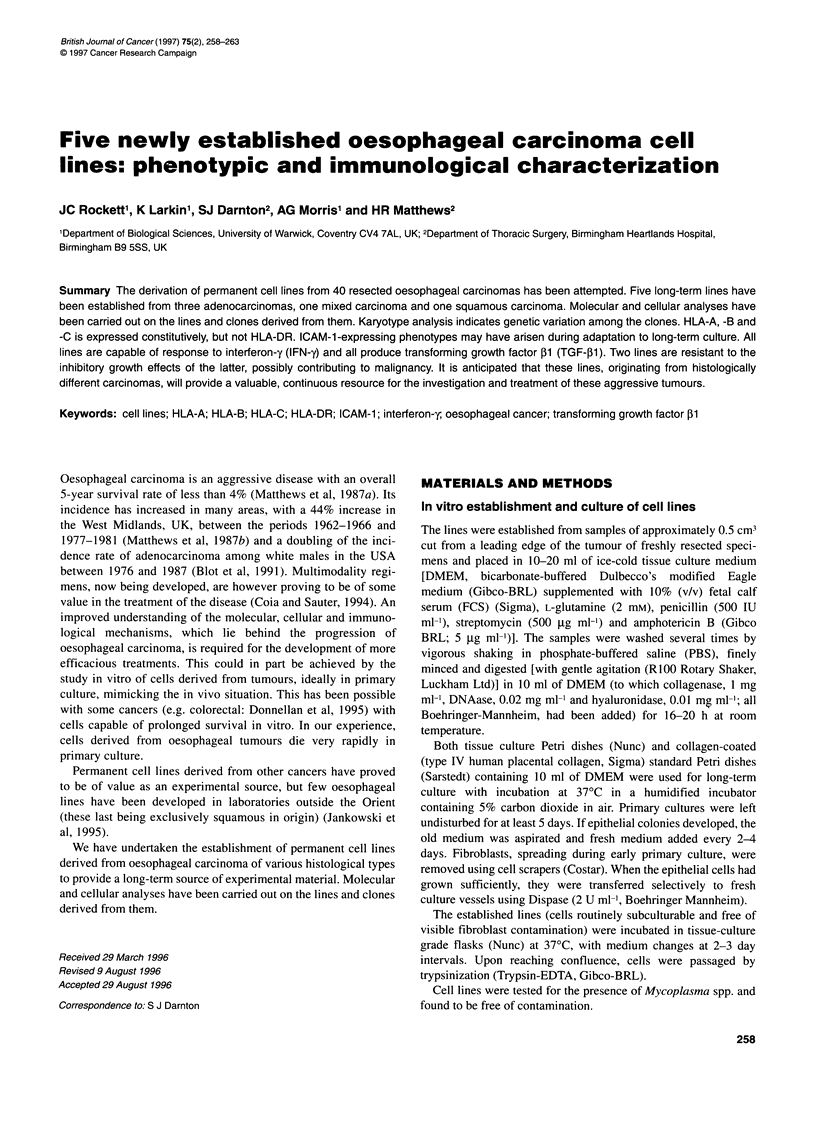Five newly established oesophageal carcinoma cell lines: phenotypic and immunological characterization (original) (raw)
Abstract
The derivation of permanent cell lines from 40 resected oesophageal carcinomas has been attempted. Five long-term lines have been established from three adenocarcinomas, one mixed carcinoma and one squamous carcinoma. Molecular and cellular analyses have been carried out on the lines and clones derived from them. Karyotype analysis indicates genetic variation among the clones. HLA-A, -B and -C is expressed constitutively, but not HLA-DR. ICAM-1-expressing phenotypes may have arisen during adaptation to long-term culture. All lines are capable of response to interferon-gamma (IFN-gamma) and all produce transforming growth factor beta 1 (TGF-beta 1). Two lines are resistant to the inhibitory growth effects of the latter, possibly contributing to malignancy. It is anticipated that these lines, originating from histologically different carcinomas, will provide a valuable, continuous resource for the investigation and treatment of these aggressive tumours.

Images in this article
Selected References
These references are in PubMed. This may not be the complete list of references from this article.
- Blot W. J., Devesa S. S., Kneller R. W., Fraumeni J. F., Jr Rising incidence of adenocarcinoma of the esophagus and gastric cardia. JAMA. 1991 Mar 13;265(10):1287–1289. [PubMed] [Google Scholar]
- Danielpour D. Improved sandwich enzyme-linked immunosorbent assays for transforming growth factor beta 1. J Immunol Methods. 1993 Jan 14;158(1):17–25. doi: 10.1016/0022-1759(93)90254-5. [DOI] [PubMed] [Google Scholar]
- Darley R., Morris A., Passas J., Bateman W. Interactions between interferon gamma and retinoic acid with transforming growth factor beta in the induction of immune recognition molecules. Cancer Immunol Immunother. 1993 Jul;37(2):112–118. doi: 10.1007/BF01517043. [DOI] [PMC free article] [PubMed] [Google Scholar]
- Donnellan I., Cantrill J., Fraser I., Morris A. Activation by interferon-gamma of expression of ICAM-1 and MHC class II antigens in tumour cells from colorectal carcinomas. Clin Mol Pathol. 1995 Feb;48(1):M40–M45. doi: 10.1136/mp.48.1.m40. [DOI] [PMC free article] [PubMed] [Google Scholar]
- Garrido F., Cabrera T., Concha A., Glew S., Ruiz-Cabello F., Stern P. L. Natural history of HLA expression during tumour development. Immunol Today. 1993 Oct;14(10):491–499. doi: 10.1016/0167-5699(93)90264-L. [DOI] [PubMed] [Google Scholar]
- Jouanneau J., Moens G., Bourgeois Y., Poupon M. F., Thiery J. P. A minority of carcinoma cells producing acidic fibroblast growth factor induces a community effect for tumor progression. Proc Natl Acad Sci U S A. 1994 Jan 4;91(1):286–290. doi: 10.1073/pnas.91.1.286. [DOI] [PMC free article] [PubMed] [Google Scholar]
- Massagué J. The transforming growth factor-beta family. Annu Rev Cell Biol. 1990;6:597–641. doi: 10.1146/annurev.cb.06.110190.003121. [DOI] [PubMed] [Google Scholar]
- Newman J., Antonakopoulos G. N., Darnton S. J., Matthews H. R. The ultrastructure of oesophageal carcinomas: multidirectional differentiation. A transmission electron microscopic study of 43 cases. J Pathol. 1992 Jun;167(2):193–198. doi: 10.1002/path.1711670206. [DOI] [PubMed] [Google Scholar]
- Roberts A. B., Sporn M. B., Assoian R. K., Smith J. M., Roche N. S., Wakefield L. M., Heine U. I., Liotta L. A., Falanga V., Kehrl J. H. Transforming growth factor type beta: rapid induction of fibrosis and angiogenesis in vivo and stimulation of collagen formation in vitro. Proc Natl Acad Sci U S A. 1986 Jun;83(12):4167–4171. doi: 10.1073/pnas.83.12.4167. [DOI] [PMC free article] [PubMed] [Google Scholar]
- Rockett J. C., Darnton S. J., Crocker J., Matthews H. R., Morris A. G. Expression of HLA-ABC, HLA-DR and intercellular adhesion molecule-1 in oesophageal carcinoma. J Clin Pathol. 1995 Jun;48(6):539–544. doi: 10.1136/jcp.48.6.539. [DOI] [PMC free article] [PubMed] [Google Scholar]
- Shimada Y., Imamura M., Wagata T., Yamaguchi N., Tobe T. Characterization of 21 newly established esophageal cancer cell lines. Cancer. 1992 Jan 15;69(2):277–284. doi: 10.1002/1097-0142(19920115)69:2<277::aid-cncr2820690202>3.0.co;2-c. [DOI] [PubMed] [Google Scholar]